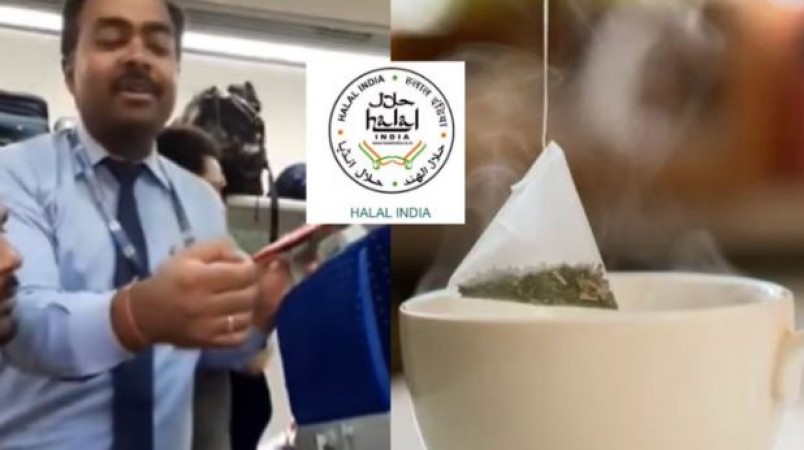
New Delhi: A video showing a heated confrontation between an Indian railways official and an agitated passenger over the serving of halal-certified tea has become viral. The passenger expressed his concern about being served halal-certified tea during the Hindu holy month of Sawan and how it hurt his religious sentiments as a devout Hindu.
@AshwiniVaishnaw @RailMinIndia @IRCTCofficial why Halal certified products are being served to Hindus? Please stop this.. @narendramodi @AmitShah @PMOIndia @HMOIndia pic.twitter.com/qlp0JV5Z4c
— Poonam (@poonam_thukral) July 19, 2023
In the undated video, the passenger questions the railway staff about the nature of halal-certified tea and its presence during the holy month. The railway official clarifies that it is a packet of masala chai premix, highlighting that the ingredients are entirely vegetarian.
This incident occurred on the Vande Bharat Express, where the passenger received a premix tea from the brand 'Chaizup.' Despite being advertised as "100% vegetarian," the tea premix had a "halal certification," which caused confusion and concern.
After the video went viral, the Indian Railway Catering and Tourism Corporation (IRCTC) tweeted a clarification. They explained that despite being 100% vegetarian, the tea premix had mandatory FSSAI (Food Safety and Standards Authority of India) certification and was also exported to countries that required halal certification for such products.
The video sparked a debate on social media about food certification and its religious implications. Many people expressed confusion about how a vegetarian product like tea could have halal certification and questioned its necessity.
Halal certification is not limited to meat products but extends to non-animal products like vegetarian food items, cosmetics, and other FMCG goods. While some claim that halal certification implies "purity and authenticity" for non-meat products, the certification process is essentially religious, considering whether the products contain any prohibited ingredients in Islam.
The justification behind halal certification for non-animal products lies in Sharia Law, where processed food is considered halal if not contaminated by substances deemed "najis" or ritually unclean. Certain ingredients like alcohol, dogs, swine, and milk of animals Muslims are not allowed to drink are considered "najis."
Halal certification has been a subject of debate due to its religious connotations and implications. In some cases, halal certification for non-meat products has raised concerns about discrimination and monopolization. Certification authorities typically employ Muslims, even for non-animal products, leading to a portion of revenue being directed to these authorities.
The government of India does not mandate halal certification; FSSAI certification is sufficient. However, businesses may seek halal certification to cater to the preferences of a minority population adhering to the concept of "The Most Intolerant Wins." In this phenomenon, businesses accommodate the preferences of a minority that strictly follows halal practices, even if the majority is indifferent.
Overall, the debate surrounding halal certification for non-animal products revolves around religious beliefs, monopolization, and catering to specific consumer preferences.
Hidden Horrors: The Disturbing Story of Ajmer's Serial Rapes Comes to Light
Furor Unleashed: Mamata Banerjee Sparks Outrage by Labeling Pulwama Attack as 'Staged'
India's Economic Odyssey: Unveiling the Present and Envisioning the Future